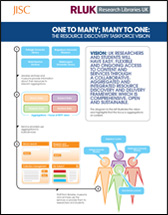The Vision
The Resource Discovery Taskforce (RDTF) Vision is to make resources more discoverable in order to add value for researchers, teachers, and managers of information assets within libraries archives and museums. The Vision document states:
"UK researchers and students will have easy, flexible, and ongoing access to content and services through a collaborative, aggregated and integrated resource discovery and delivery framework which is comprehensive, open, and sustainable."
Working to enable this Vision, JISC and its partners and the Discovery team have undertaken a wide-ranging programme of activity. Since 2011 the Discovery programme has been building critical mass by opening up data, providing examples and communicating outcomes.
Aims
Discovery has been working to:
- Clearly position and define the benefits of the RDTF Vision to research and education at the local and national level
- Improve the discoverability of UK library, archives and museum content
- Drive a shift in ethos to 'open' in institutions, services and funding bodies
- Improve the quality and sustainability of new and existing resource discovery infrastructure
- Be understood, endorsed and promoted by key stakeholders within the library, archives, and museums sector and beyond
Targets:
- Progress embedding of the technical, licensing and metadata principles
- Drive innovation and sustainable, benefits-led reuse of LAM open metadata
- Identify and establish core efficiencies in dataflow and aggregation that can be achieved by key shared UK bibliographic data services
- Establish open licenses for JISC library and archives service metadata and other key UK LAM aggregations
- Develop demonstration exemplars of what is possible, strengthening the business case for open data and also identifying issues for sustainability
- Open up and make discoverable important but hidden collections
- Demonstrate and support approaches to inaccessible metadata and where no metadata exists
- Persuade funding bodies and vendors to support the key principles
- Engage with related initiatives to ensure that the approaches recommended in Discovery are compatible with relevant work occurring elsewhere.
- Work with related JISC initiatives to explore how they can be integrated into the Discovery framework
Outputs:
- Discovery Open Metadata Principles – a set of principles aimed at increasing the impact of scholarly research and cultural and academic collections by enhancing the metadata ecology for UK education and research.
- Technical Principles for the Discovery Ecosystem – seven over-arching technical principles to underpin the Discovery ecosystem.
- Discovery Blog – articles and thought pieces authored by members of the Discovery team, together with news digests covering current open metadata activity from within our sectors and beyond.
- Discovery newsletter – articles and interviews highlighting the latest activity from within the Discovery programme. Subscribers to the newsletter represent a community of engaged people from a wide range of MLA organisations in the UK and further afield.
- Discovery engagement events – the ‘Opening Data – Opening Doors’ event (Manchester, April 2011) advocacy workshop was followed by the Discovery Conference (London, May 2011) where we launched the Discovery Open Metadata Principles.
- Archives and Museums focus group – representatives of the museum and archival communities came together for a day of discussion in search of common ground
- Licensing Clinics – the first Licensing Clinic took place in May 2012, and invited attendees to explore practical approaches in response to the Discovery open licensing principles. Further Clinics are taking place during Autumn 2012.
- Opening Up Metadata: Challenges, Standards & Tools event – a collaboratively organised event for non-technical staff from within the library and cultural heritage sectors.
- Celebrate Liberation competition – a global developer competition that invited entrants to build open source software applications / tools, using at least one of the 10 open data sources provided. The shortlisted entries demonstrated a wide variety of uses cases for open metadata.
- Exemplar projects – we are currently supporting the development of two large scale exemplars to demonstrate the potential for content aggregation around a single research topic, made possible through open metadata.
- Phase One Discovery projects
- Phase Two Discovery projects - This second phase of 14 Discovery projects contains two strands, Open Metadata and Developing Services. The projects within both strands are building on the work accomplished by the Phase One projects.
- Discovery Lessons – a series of publications sharing the lessons learnt from the Phase One Discovery projects, which resulted from the Phase 1 Project Synthesis activity.
- Licensing Open Data – a Practical Guide – Discovery commissioned Naomi Korn and Professor Charles Oppenheim to provide practical guidance for organisations who are considering the issues associated with licensing and/or using open data.
- Views From the SCONUL Fringe - two workshops involving library leaders from the SCONUL community enabled the Discovery team to capture real voices on where we are with Discovery services in academic libraries and the perceived direction of travel. The views captured in the course of those workshops were collated into a report: ‘Making resources more discoverable – a business imperative?’
- The Business of Discovery - Reflections of UK academic library directors - a series of eight thematically edited videos which capture the views of academic library directors reflecting on the business case for discovery.
- Case studies
- Guidance materials?

